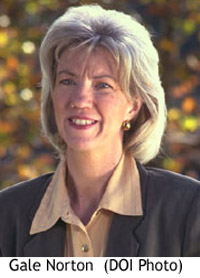Before she departed the Interior Department, Gale Norton dashed off a lengthy email to her employees, praising them for their efforts and lauding the incredible beauty of America's public landscape that she was able to view as Interior secretary. She waxed poetic about misty wisps floating about Yellowstone National Park's Old Faithful Geyser in 22-below-zero cold, about gazing from the lip of Canyonland National Park's Island in the Sky District, and about circling Mt. McKinley in a plane.
The former secretary, who is heading back to Colorado to ponder her next move, talked about being able to snorkel in the Virgin Islands, of roaming amid grizzly bears in Alaska's backcountry, and of crawling deep into a recess of Carlsbad Caverns, a place "where even the park superintendent had never been."
It is at times a very poignant farewell, for Ms. Norton relates to her employees many of the same thoughts and emotions that visitors to our national park system experience as they roam those incredible landscapes.
But some might take exception to how she portrays herself as a "Westerner" while seemingly belittling Easterners for what she perceives to be their lack of understanding, and appreciation, of Western issues.
Though she admits to arriving in Washington as a "deep-down Westerner," she quickly adds that she "...never really understood how different the perspectives were between East and West."
And that's unfortunate. For while there truly are different perspectives between Westerners and Easterners, as well as between Rocky Mountain Westerners and California Westerners, Ms. Norton's parting at times seems to come across as if she must upbraid anyone who's not from the Rocky Mountain States for their perspectives.
"Easterners," she writes, "don't seem to grasp the immensity of the West. You have probably seen a popular poster that depicts the New Yorker's view of the country. It shows Manhattan as very large, with the rest of the country miniaturized into a much smaller area.
"I had long suspected that some New Yorkers viewed all western federal lands as being Yellowstone, plus a few other acres," Ms. Norton continues. "The communications office confirmed this lack of perspective when they counted up how many times the New York Times had editorialized about snowmobiles in Yellowstone during the last five years. Believe it or not -- 25 times! For all the important issues we deal with, for all our myriad projects restoring lands, for planting a million trees to cover reclaimed coal mines with hardwood forests, for reaching a resolution of decades-old conflicts on the Colorado River, for offshore oil wells withstanding hurricane forces, for making dramatic progress in Indian trust accounting -- to the New York Times our most notable issue was snowmobiles in Yellowstone."
I must admit I haven't kept count of the Times' editorial positions. Nor have I counted the number of other newspapers -- from the New York Times to the L.A. Times and countless papers between -- that have gone on record as opposing Interior's position on snowmobiles in Yellowstone. Has the DOI staff tallied the sheer number of editorials about snowmobiles in Yellowstone that have been written the past six years?
Perhaps the New York Times and all those other papers felt it was such an important issue because Yellowstone is our country's and the world's first national park. It's the place where the preservation movement really gained some momentum and a vision, and so perhaps the editorial writers' views were that if air, water and sound pollution are endorsed and encouraged in Yellowstone, well, what does that mean for the preservation of other national parks, and other public lands, that are not as well-known or held so highly?
Later in her farewell Ms. Norton, perhaps subconsciously, seems to opine that only Westerners struggle with public lands issues, writing that, "We Westerners face innumerable conflicts about the use of our lands, both public and private. Even as we consider the economic development that may disturb the land, we work from a common base of loving the land and the wildlife. There are no easy answers, because we all care so much."
Indeed, there are no easy answers. But perhaps a more inclusive approach could breed some workable solutions. Just as federal land-management agencies can't, and shouldn't, ignore input from the Western communities that rely on public lands for their livelihoods, those agencies can't, an shouldn't, ignore input from Americans elsewhere in the country who also have a stake in how those public lands are managed.
Perhaps if Americans from all time zones, not just those in the Mountain Zone, gained some education on the complexities of managing public lands in one of the most arid regions of the country, just perhaps they could lean on their congressional representatives to become more astute when Interior Department issues arise and so make wiser decisions.
I'll admit that, as an Easterner by upbringing, it took a while to get up to speed on Western issues once I headed West in 1985. But it wasn't that steep of a learning curve.
I'd venture that, given a chance and some good materials, those "Easterners" that Ms. Norton seems to shake her head over, could in good time come not only to appreciate the nuances of Western life but also contribute to some workable solutions for the problems we all face in the management of our public lands.
Hopefully Dirk Kempthorne, if confirmed as Ms. Norton's successor, won't be so quick to shake his head at those outside of the Rocky Mountain West.


 Support Essential Coverage of Essential Places
Support Essential Coverage of Essential Places







Comments